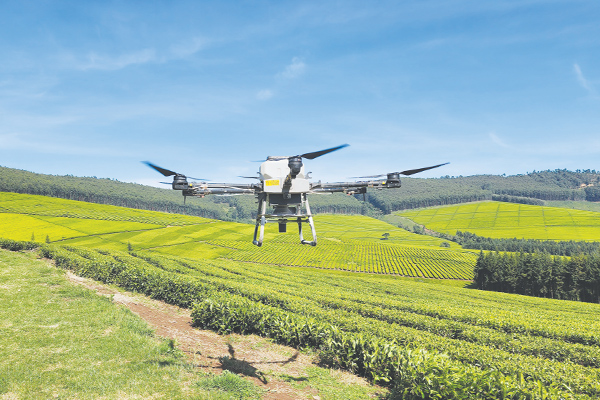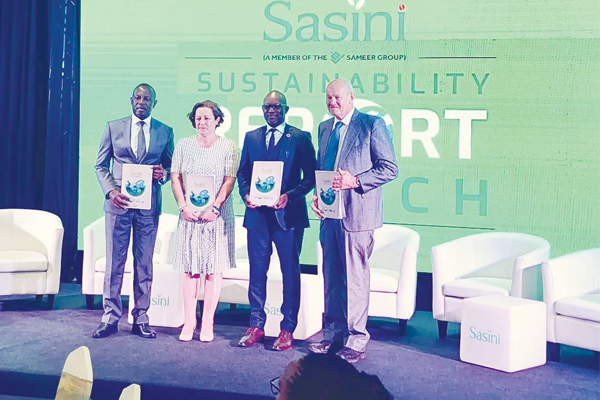#1
SASINI
Sasini PLC, established in 1952, stands out as one of Kenya’s leading sustainable businesses, a status earned through its tireless dedication to quality and agricultural innovation. Listed on the Nairobi Securities Exchange (NSE) and affiliated with the esteemed Sameer Group of Companies, Sasini boasts over 7,000 shareholders, predominantly Kenyan, reflecting its deep-rooted local origins and connections. The company specialises in the growing, processing, marketing, and exporting of tea, coffee, avocado, and macadamia nuts, and value addition of related products for the local market.
Sasini’s commitment to business sustainability is evident in its day-to-day operations, with a core focus on environmental, social, and governance (ESG) practices. The company has adopted a holistic approach to integrating sustainability initiatives in all its areas of operations across the business anchored within the United Nations’ Sustainable Development Goals (UN SDGs) and UN Global Compact principles, as well as the agenda of continuously creating value for its stakeholders. The mainstreaming of the SDGs is well entrenched in the company’s strategic framework, and it has been working with nine SDGs since 2019 to help deliver real impact on issues to do with sustainability.
Sasini is deeply committed to environmental sustainability, evident through various climate change and renewable energy initiatives that it is fostering. For instance, Sasini has recently commissioned a 1.5 megawatts (MW) solar energy generation station, a move that not only demonstrates its dedication to clean energy but also reduces its reliance on the national grid, ultimately saving 25-30 percent of power drawn from the national grid for its tea operations.

Furthermore, its mechanisation of tea farming has enhanced the quality and quantity of tea harvested, as well as led to significant cost savings. By optimising the harvesting process, the company is able to reduce land use and energy consumption, contributing to eco-friendly practices.
Additionally, Sasini, through its environmental policy statement, has integrated waste management practices to minimise potential risks to the environment and human health. The company has implemented an effective pollution prevention and rigorous waste management strategy that ranges from waste minimisation programs, to segregating waste at the source for re-use, recycling, and composting materials. Furthermore, dedicated areas have been set to handle solid waste, while each factory employs National Environment Management Authority (NEMA) approved effluent treatment plans for liquid waste. Plastic waste is collected by licensed recyclers, and scrap metals and used polybags are repurposed ingeniously. Green leaf tea waste is utilised as valuable manure and mulch, contributing to sustainable agriculture. Even boiler ash finds purpose in landfill applications. Through various certification bodies such as Rainforest Alliance, Sasini maintains its own indigenous tree forests in all its farms and estates. The Sasini-maintained forests have over 1.5 million trees, with the forests offering rich habitats for flora and fauna, and hence able to support the goal of supporting life on land.
The agribusiness’ use of drone technology is a testament to its innovative approach. It facilitates early identification of diseased plants and ensures efficient and customised application of fertilisers based on soil and plant needs. The results have been improved efficiency and sustainability in the agricultural operations.
Sasini’s commitment to social responsibility is equally impressive. The corporation prioritises gender representation, with women constituting 40 percent of the senior leadership, and 38 percent of the overall employment base. It has committed to a 50/50 balance by 2026. Towards employee-centric initiatives, Sasini offers parental leave, extending the benefit to both male and female employees, and facilitates flexible work arrangements post-leave. In terms of workforce diversity, all new hires are strategically distributed across divisions, promoting inclusivity. The agribusiness invests substantially in training, allocating significant resources to upskill employees, and actively engages them through workplace fora, ensuring their voices are heard. Sasini’s strong focus on safety is reflected in its Safety, Health, and Environment (SH&E) working committees and regular training sessions, guaranteeing a secure work environment. This holistic approach underscores Sasini’s dedication to creating a nurturing, diverse, and inclusive workplace.
In community and social development, Sasini prioritises positive relationships with local communities, particularly in the smaller areas where it operates significantly. These connections are crucial for Sasini’s successful business operations and are centred around water stewardship, living wage actions, gender equity promotion and actions, climate action projects and fostering financial partnerships in its community-focused sustainability initiatives. By engaging actively with communities, Sasini attracts and retains employees, mitigates business risks, and effectively manages its most crucial stakeholders. The company tailors its initiatives to meet specific local needs and aims to make meaningful contributions to community wellbeing.

Sasini representatives participate in community-based groups and industry associations, making substantial contributions to community development. Activities like tree planting in schools and neighbouring communities, as well as enhancing education and healthcare, demonstrate Sasini’s commitment to the local environment and residents. The company’s involvement in education includes supporting local schools, offering free education to employees’ families, and collaborating on new educational facilities. Sasini also partners with non-governmental organisations (NGOs) to empower youth, fostering socio-economic growth.
Sasini further demonstrates unwavering dedication to social responsibility through its commitment to ensuring product safety and quality. Guided by global international industry standards and national regulations, it invests significantly in product audit and safety measures, guaranteeing not only value but also loyalty and health to customers worldwide. The company’s holistic approach includes transparent communication, strategic guidance, and a cross-functional system that integrates product stewardship-related topics such as regulatory compliance, environmental impacts, and food safety performance. Sasini actively collaborates with suppliers to minimise chemical residues, emphasising science-based solutions and responsible chemical use. The company’s robust traceability program ensures efficient handling of inquiries, and certifications from internationally recognised standards affirm Sasini’s prudent food safety practices and traceability at all production levels.
Sasini’s promise of good corporate governance is reflected in its adherence to ethical values, integrity, and respect. The company actively engages in ethical trade practices through Supplier Ethical Data Exchange (SEDEX) membership, ensuring transparency and responsible conduct within its operations and value chains. Upholding human rights principles and international standards, Sasini respects laws such as the UN’s Universal Declaration of Human Rights and the UN’s Guiding Principles on Business and Human Rights.
In data privacy, Sasini complies with the Data Privacy and Protection Act 2019, safeguarding stakeholders’ privacy. In sustainable supply chains, it proactively manages risks, conducts human rights due diligence, and implements grievance mechanisms to address all stakeholders’ concerns. Additionally, Sasini supports out-grower farmers by promoting sustainable agricultural practices, fostering a fair and transparent supply chain that benefits both the company and its community partners. Through these initiatives, Sasini ensures responsible corporate conduct and contributes to the wellbeing of its stakeholders and the wider society.
The company self-presents as a beacon of excellence in the ESG space, underscoring its role as a star performer, and setting high standards for sustainable practices, community engagement and positive environmental impact within the East African agribusiness industry.
















